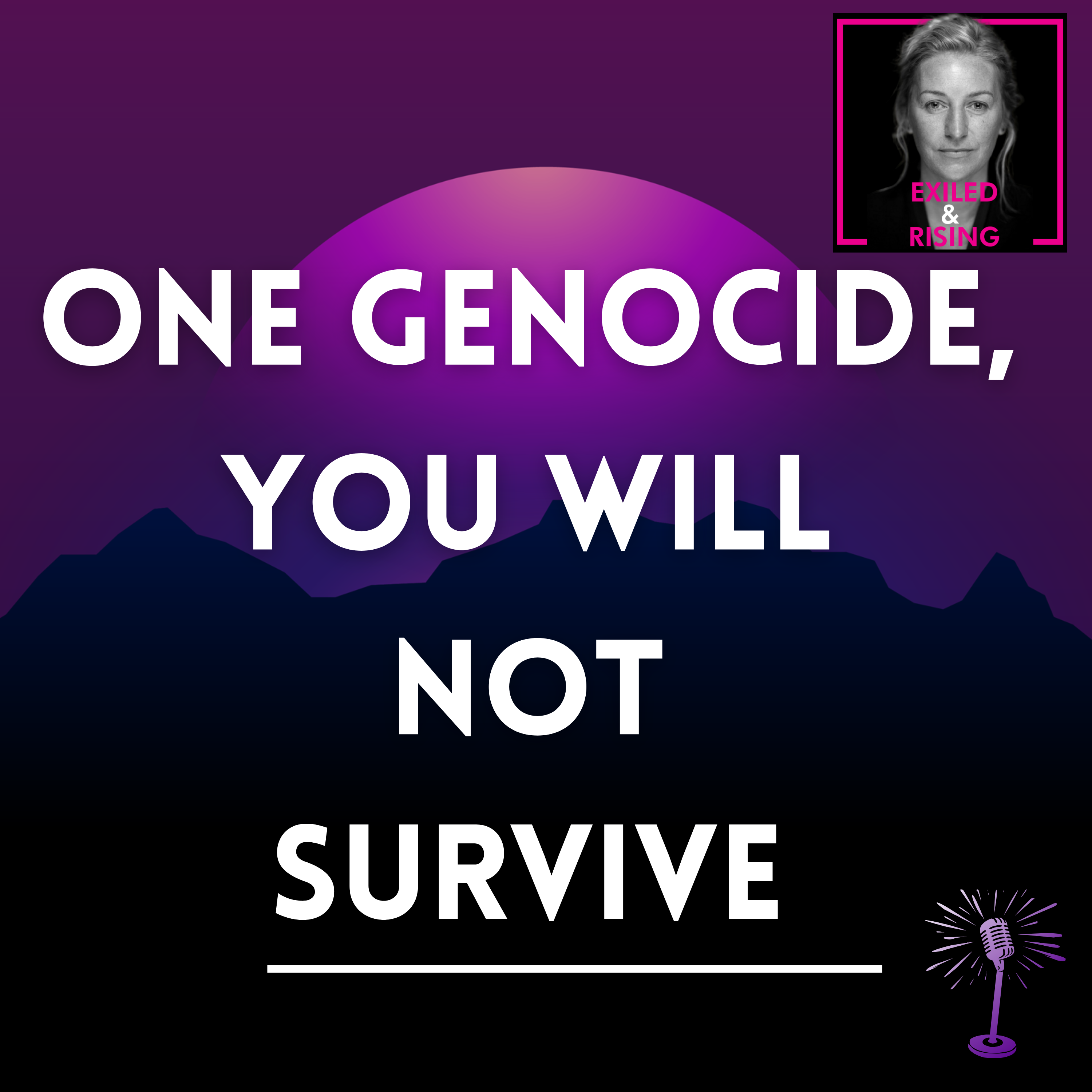Show Notes
In this unfiltered, soul-witnessing episode of Exiled and Rising, Ana Mael reads directly from page 185 of her memoir The Trauma We Don’t Talk About. This is a reading and reflection—not from the past, but from the living, ongoing truth of what genocide does to the body, the nervous system, and the identity.
In a world where genocide is happening in real-time, and where survivors are still being erased in therapy rooms, courtrooms, and spiritual circles, Ana Mael offers a rare and urgent voice—as a licensed somatic trauma therapist, a war refugee, and a genocide survivor.
Her words come not from theory, but from the bones of lived experience.
From decades of witnessing the aftermath—in her own body, in her clients' stories, and in the nervous systems of those who were never fully seen.
And that’s what makes this episode so politically vital:
-
She is one of the only trauma professionals publicly naming genocide from both inside and outside the field.
-
She speaks not just of healing—but of truth, justice, and dignity as non-negotiable parts of trauma recovery.
-
She refuses to sanitize or spiritualize violence to make it more palatable for systems that benefit from silence.
In a time where:
-
Genocides are denied
-
Survivors are dismissed
-
Wellness spaces avoid politics
-
And therapy often demands forgiveness without accountability…
Ana does something radical.
She tells the truth.
She calls for justice.
She names what others are too afraid—or too removed—to touch.
This is not just a podcast.
This is testimony.
This is somatic resistance.
This is advocacy through the nervous system.
And it’s what makes Exiled and Rising one of the most politically and spiritually relevant trauma podcasts of our time.
❤️ Support the mission & keep the podcast alive and ad FREE: Donate
https://donate.stripe.com/3cI9AS5Xfb9W6O832VfEk00
Core Themes and Lessons:
-
Surviving genocide is not the whole story. Ana survived three wars, like her parents and grandparents. Fifty-eight people survived—but what wasn’t survived was the genocide of the self: name, childhood, innocence, and humanity.
-
Resilience comes with a cost. The fear wired into bones doesn’t disappear. What looks like strength to others may feel like unlivable tension inside the body.
-
This isn’t a history lesson—it’s a nervous system reality. When your body has prepared itself to survive genocide, it does not unlearn that readiness easily. It carries that into daily life, decades later: into work, relationships, parenting, and even moments of stillness.
-
Identity trauma is cumulative, not just personal. If the genocide of your ethnicity, religion, and humanity is never acknowledged, your children will inherit the silence. Your grandchildren will inherit the somatic residue of shame and loss.
-
What we don’t say becomes our sickness. This episode opens a portal into truths we’re often told not to name. Truths that are “too much,” “too political,” or “not spiritual.” And yet, they live in the nervous system waiting to be heard.
Meet Your Host: Ana Mael
Ana Mael is a genocide and war survivor, somatic therapist, and founder of the Somatic Trauma Recovery Center. She has dedicated her work to helping survivors reclaim their identity, dignity, and self-trust.
She is the bestselling author of The Trauma We Don’t Talk About—a #1 book in over 10 categories, including Mental Health, Personal Testimonies, and Memoirs.
Ana Mael’s insights are unflinching, trauma-informed, and radically honest. Her podcast Exiled and Rising merges the depth of somatic trauma healing with fierce social justice—centered around the lived realities of marginalized, displaced, and silenced bodies. With a voice that is both compassionate and defiant, Ana dismantles spiritual bypassing, confronts systemic harm, and offers a grounded, body-based path to healing rooted in dignity, truth, and personal sovereignty.
Ana lives in Toronto, Canada, where she works directly with clients and educates mental health professionals and counsellors on displacement, exile, and war trauma recovery. She leads training programs, provides trauma-informed therapy, and conducts research to bridge the gap between somatic therapy and global crisis trauma care.
❤️ Support the mission & keep the podcast alive and ad FREE: Donate
Join Premium Membership for deeper dives, distilled micro-lessons and therapy takeaways for this episode.
Premium members get the full takeaways summaries, with micro-lessons, therapy tools, and somatic journaling prompts to bring this work into real healing.
For YOU. For clinicians. For anyone ready to rise.
The Somatic Trauma Recovery Center: Visit the Website
Follow, Review, Share!
From Trauma to Resilience. From Wounds to Resistance.



